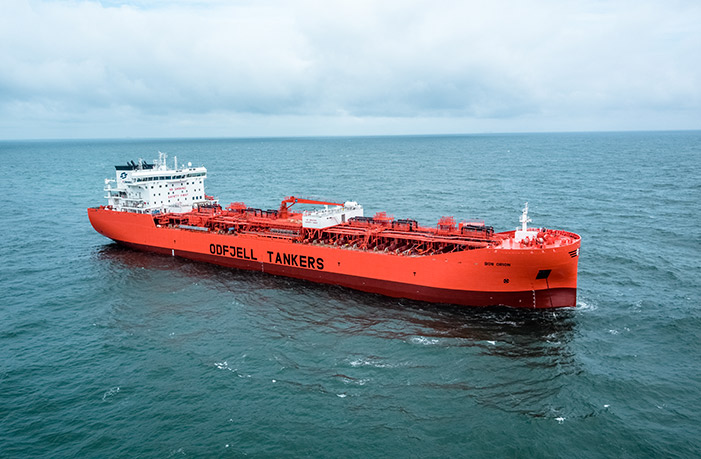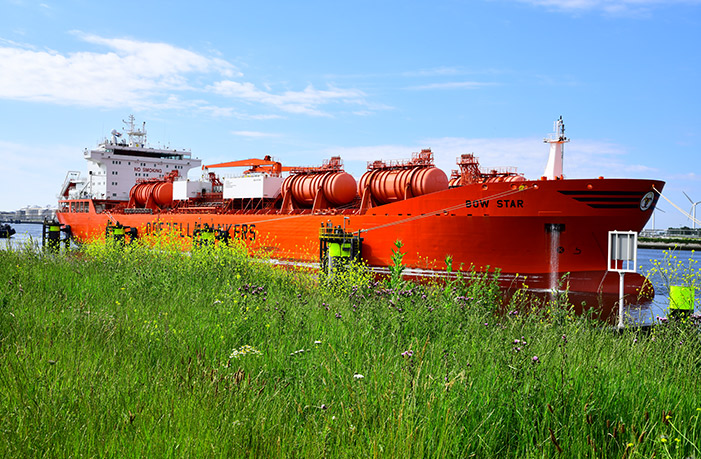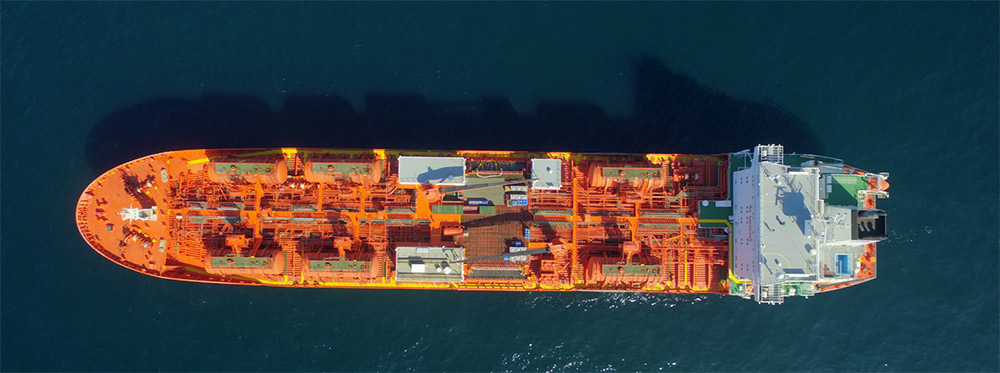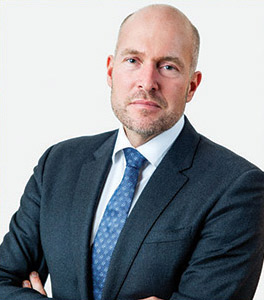Q: Odfjell SE as a company has clearly placed sustainability on the agenda. Why is sustainability important to you?
Ans : Sustainability for us is about having a long-term perspective on the way we do business. It is about the actions we take today for the future of the company and future generations. The best evidence for this way of thinking is our 107-year history, and we plan to be here for the next 100 years as well. To do so, we need to act responsibly and think about our business’s long-term effects on people and the planet.
Climate change is one of the biggest challenges of our times. Global warming is caused by increased concentrations of greenhouse gases (GHG) in the atmosphere, mainly from human activities such as burning fossil fuels. To tackle climate change and its negative impacts, 197 countries adopted the Paris Agreement in December 2015. The agreement aims to substantially reduce global GHG emissions to limit the global temperature increase in this century. We have to do our part to achieve the aims of the Paris Agreement.
We often talk about sustainability as part of our environmental, social and corporate governance (ESG). Good governance and compliance are essential for gaining the trust of society. A vital part of our governance work is our clear stand against corruption. At the top of our social agenda is the safety of our people and the people who work for Odfjell. Safety is integral to all parts of our business.
Our people are vital for our business to succeed, now and in the future. Our industry will, over the next years, transform into a low- or zero-carbon industry. To achieve this, we need access to talents and new ways of thinking. We need to be able to recruit people from all backgrounds, genders and cultures. We believe that diversity is vital to develop high-performance teams. That is why we have set a clear target for diversity.
Failing to operate in a sustainable way presents significant risks to our industry, locally and globally. Climate risk affects all businesses, but also creates many opportunities for those able to adapt and willing to work to make a positive change. That is why sustainability and safety are integral to our business.
Øistein Jensen is the chief sustainability officer at Odfjell SE. In this role, he has overall responsibility for sustainability, compliance and strategic safety for the group.
Øistein is an executive with extensive experience in naval leadership, management consulting, corporate governance and shipping. Having served as a submarine captain and as director in PWC, and a captain of a submarine in some of his roles, Øisteins training includes a bachelor’s in military science, Naval Academy and an MBA in business controls and various courses in psychology and sustainability. He is also a member of the board of directors of the Maritime Anti-Corruption Network (MACN).
Odfjell is one of the world’s largest chemical carrier companies. Set up in 1914, the company pioneered the development of chemical tanker trades in the middle and late 1950s and the tank storage business in the late 1960s. The company owns and operates a large fleet of sophisticated chemical tankers and has a joint venture network of tank terminals.
Q: How are the industry and Odfjell working to mitigate climate change?
Ans : Shipping was not directly included in the Paris Agreement. In 2018, the International Maritime Organisation (IMO) responded and launched a strategy to reduce GHG emissions from shipping.
Maritime transport emits 2.9% of global GHG emissions. Due to increasing global demand for seaborne transport, this will increase dramatically if our industry does not reduce emissions. But shipping is also the most environmentally friendly way of transporting large volumes over great distances, making it beneficial for the planet if we move more cargo by shipping. So, shipping is a part of the problem, but also part of the solution.
We have done a complete analysis of our fleet to identify what we need to do to meet the IMO goals. We also identified what reductions could be possible if we really pushed ourselves. This work resulted in new climate goals that go far beyond the IMO targets:
- Odfjell will cut GHG emissions by 50% by 2030 compared to 2008.*
- Odfjell is dedicated to pursuing a zero-emission strategy and will order only vessels with zero-emission technology from 2030.
- Odfjell will have a climate-neutral fleet from 2050.
- Odfjell will actively support initiatives to develop technology and infrastructure to achieve zero emissions and will support international regulations in the drive to attain zero emissions by our industry.
- Intensity Target
Emissions are based on transport work and the annual efficiency ratio (AER). By committing to these ambitious climate targets, we have set the direction for our work in the coming years. We have to operate safely, be profitable and deliver on our fleet transition plan. We need to do what we can to support the UN’s Sustainable Development Goals (SDGs).


Q: What is the major challenge to achieving your long-term climate ambitions and what is your strategy for achieving zero emissions?
Ans : The major challenge for our industry, especially deep-sea shipping, is that there is no commercially available alternative to combustion engines today. We need to find a zero-emission fuel and then build enough infrastructure to supply that fuel to the global fleet. So, this challenge has many owners. We follow all energy carriers, but it is a high risk to bet on one any of them. We believe that zero emissions is not about technology or fuel itself, it is about building a zero-emission fuel infrastructure that we do not control. We want to keep as many doors open as possible, and fuel flexibility is, therefore, part of our strategy.
Q: How has the ongoing COVID-19 pandemic affected your emission reduction plans and goals?
Ans : At the start of COVID, we focused on operations, operations and operations. But generally, I believe that COVID has accelerated ESG activities and intensified society’s focus on ESG. Moreover, COVID has speeded up the transition to a low-carbon society. For Odfjell, our plans to reduce CO2 emissions to achieve our targets while continuously focusing on safety and efficiency have not been delayed by COVID.
Q: To comply with the IMO 2020 regulation, why did you choose low-sulfur fuel oil over scrubbers for your vessels? How would you assess this decision now?
Ans : The intention of IMO 2020 was to limit sulfur oxide (SOx) emissions from ships to improve air quality and protect the environment. SOx is harmful to human health as it causes respiratory problems and lung disease. SOx in the atmosphere results in acid rain, which can harm crops, forests and aquatic species and contributes to the acidification of the oceans.
We believe it was a good decision to not invest in scrubbers. Firstly, we do not believe it was the intention of the regulation to allow the sulfur scrubbed from air to be dumped into the sea through an open-loop scrubber. Secondly, we anticipated that the fuel producers would quickly adapt to the new market and that the price spread between high-sulfur fuel oil (HSFO) and very low-sulfur fuel oil (VLSFO) would be less than first estimated. Third, we were struggling to make a good business case for scrubbers, given all the factors such as price, payback time, efficiency, energy use, off-hire, technical complexity, running costs, slop disposal, local regulations, etc.
Our organisation was very well prepared for IMO 2020, from fuel contracts to updated procedures. All our vessels were already technically ready. Odfjell has not had issues with the availability of fuel. Moreover, we have had fewer problems with the VLSFO than we have had with the HSFO.
Q: You mentioned that tackling corruption is an integral part of sustainability and the way you do business. How do you work towards this?
Ans : Corruption inhibits economic growth and damages business operations, employment and investment. Corruption limits the realisation of all SDGs in many respects, as the vast sums that are lost to corruption could have been used to improve living standards, such as by increasing access to housing, health, education or clean water.
Fighting corruption is not something that one company can do alone. That is why we are a member of the Maritime Anti-Corruption Network. As an industry, we are taking collective action and standing shoulder to shoulder against any form of corruption or facilitation. Odfjell has a clearly stated zero-tolerance policy on corruption.
Q: What are the core values of Odfjell that drive your collaborations with your partners?
Ans : Our values can be summarised as professional, sustainable, proactive and innovative. These are also the values that drive our collaborations with our partners. We commit to generating value for our customers by offering them safe and reliable transportation and by storing their products at a competitive cost.
Our goal is to deliver on spec and on time and to adapt our services to cater to our customers’ needs.
Q: How has COVID-19 affected your interactions with your vendors, partners and clients?
Ans : Maritime trade is all about relations. We are in daily dialogue with all our customers, suppliers, vessels, agents and other stakeholders. Before COVID, many of our employees travelled extensively to meet with our partners around the world. I visited India multiple times in 2019. Since March last year, we have not been able to do so. Thus, I am impressed by how we, together with our partners, have been able to run our businesses and collaborate, safely and efficiently, worldwide.
I think all of us are looking forward to meeting in person again, but the times have also shown us that it is possible to work efficiently without traveling. This has been an eye-opener for both our partners and us and will probably change the way we think about travel and interactions. Our industry is still all about relations, and we will continue meeting our partners, but our experiences of working purely via digital platforms will continue to increase our efficiency.

Q: COVID caused major challenges for seafarers trapped at sea. How did you handle this?
Ans : Several criteria need to be in place for a successful crew change: a port that allows the crew change, available flights plus connecting airports, and the crew members’ home countries have to allow seafarers to travel in and out. Most of these factors all but disappeared when governments closed their borders and implemented travel restrictions due to the COVID-19 pandemic.
The safety and health of our people are our top priority. We took a multi-faceted approach to mitigating the crew change crisis. Our crewing departments worked relentlessly to find solutions in cooperation with our trade teams, management and agents and with the local authorities. We initiated route deviations to cooperative ports to facilitate safe and efficient crew changes and continuously monitored developments in the ports where our ships were due to call. Different countries had different requirements for ships and seafarers, and we diligently worked to comply with all of these.
Keeping the global supply chain intact is critical, and it would not be possible without seafarers. They are key workers, and we need to ensure their safety and health, we have appealed to governments across the world to allow crew changes and facilitate travel logistics.
Q: In terms of bulk chemical shipments, how does India figure as a supplier and consumer compared to other nations? Do you expect to see more business opportunities in India?
Ans : India is a fast-growing consumer of chemicals, and increased business opportunities are a natural expectation for the future. While India is not a major exporter of chemicals, it is an important hub for chemical tankers heading towards the Middle East after discharging their cargoes. So, in essence, India is an essential element in complementing trades within our market, as we can link its imports with export opportunities from the nearby Middle East.
Q: Are there any challenges with Indian ports and terminals that you wish were better handled?
Ans : Port tariffs are always a concern for all shipowners. Terms and tariffs can vary widely among different ports. We believe that standard policies and tariffs would be beneficial, especially for ports operated by the government. Fast turnarounds are essential to us. So, since our vessels can discharge and load multiple grades simultaneously, we would like the tank terminals to increase their capacity, both for multiple grade operations and for berthing.
